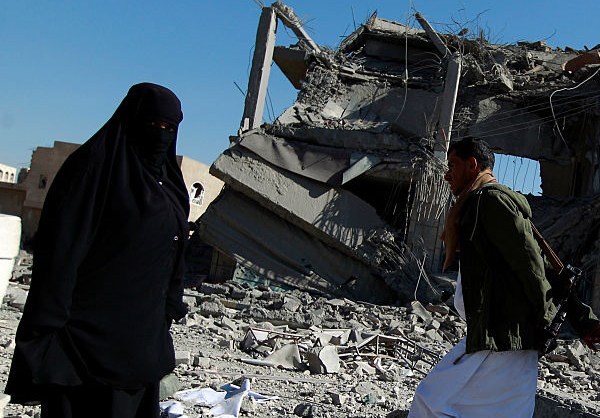
RNA - Pentagon reports and official figures on civilian casualties in their airstrikes in Iraq and Syria are well less than 10% of the count as figured by private organizations, human rights groups, and international aid agencies, including those of the United Nations. As the civilian deaths grow in the twin air wars, that undercount is becoming even more dramatic, and the oversights all the more glaring.
The official March count is 26 civilians killed in Iraq, which is insultingly low. It is far, far below the well-documented figures of even individual airstrikes by the US in the course of that month. On March 17 alone, US planes attacked and destroyed three buildings in Western Mosul’s Old City, burying massive numbers of civilians under the rubble. Preliminary tolls around the attack put the deaths in excess of 200 civilians, and ultimately it reached closer to 300 civilians killed. The Pentagon admitted to the incident, then somehow, “nearly 300” became 14 civilians by the time it got to the March report!
The same is true in Syria. The day before the Mosul attack, American warplanes hit and destroyed a mosque in al-Jineh, killing scores of civilians within. This incident didn’t even manage to make it into the final toll. Indeed, while hardly a day goes by in the past couple of months without US strikes causing civilian casualties, the whole Pentagon report for March boils down to three incidents, and even those are dramatically understated. The Pentagon insists it does all it can to prevent civilian deaths, but in practice this has meant doing all it can to kill more civilians and cover them up.
This is while the right of belligerents to adopt means of injuring the enemy is not unlimited. Besides the prohibitions provided by international conventions, it is especially prohibited: To kill or wound treacherously individuals belonging to the hostile nation or army; to kill or wound an enemy who, having laid down arms, or having no longer means of defense, has surrendered at discretion; and to employ arms, projectiles, or material of a nature to cause superfluous injury to civilian populations.
Other prohibitions include the attack or bombardment of towns, villages, habitations or buildings which are not defended; the commander of an attacking force, before commencing a bombardment, should do all he can to warn the authorities; and in sieges and bombardments all necessary steps should be taken to spare as far as possible edifices devoted to religion, art, science, and charity, hospitals, and places where the sick and wounded are collected.
Obviously, this last prohibition, the Laws and Customs of Law on Land (Hague, IV), didn’t apply to the US occupying forces and war planes, as they hit, killed and wounded scores of civilians on March 16 in a mosque in al-Jineh – on the pretext that it was used for military purposes. At any rate, it is not the duty of the besieged populations to indicate the presence of such buildings or places by distinctive and visible signs, which shall be notified to the enemy beforehand. It is in fact the duty of those who turned these cities and towns into terror-infested, highly confusing and complicated set of battles to take all necessary steps to spare places where civilians, mainly children and families, are collected.
Tragically, the high number of civilian death tolls in Pentagon airstrikes is not limited to Iraq and Syria, where war-party Washington has decidedly taken the side of Saudi-backed, Qaeda-allied “moderate” terrorist forces. In Yemen, the US has also taken the side of the Saudi-led coalition, where Defense Secretary James Mattis claims "Iran’s destabilizing influence in the Middle East would have to be overcome to end the conflict in Yemen, as the United States weighs increasing support to the Saudi-led coalition fighting there."
That Iran is not providing any weapons to the Ansarullah resistance forces is beyond dispute. Reports by the United States intelligence community have verified just that. But it’s important to clarify what support the US has given to the Saudi-led coalition. As of March 21, 2016, Human Rights Watch reports weapon sales worth billions of dollars to Saudi Arabia, including Patriot Missiles, ammunition, hand grenades, Lockheed Littoral Combat Ships, aircraft, helicopter, drones, advanced air-to-surface munitions, laser-guided bombs, bunker buster bombs, and MK84 general purpose bombs.
What has the Saudi-led coalition done with all of this American weaponry? A United Nations High Commissioner for Human Rights panel of experts reports it here: "At least 3,200 civilians have been killed and 5,700 wounded since coalition military operations began, 60 percent of them in coalition airstrikes."
Likewise, a Human Rights Watch report, referring to the UN panel’s findings, notes that the panel documented US-backed, Saudi-led attacks on camps for internally displaced persons and refugees; civilian gatherings, including weddings; civilian vehicles, including buses; civilian residential areas; medical facilities; schools; mosques; markets, factories and food storage warehouses; and other essential civilian infrastructure, such as the airport in Sana’a, the port in Hodeidah, and domestic transit routes.
In light of these findings, it is safe to conclude that what the United States and its coalition partners in crime are doing to Iraq, Syria and Yemen has nothing to do with fighting terrorism or containing Iran, and everything to do with killing as many civilians as possible. They are consistently doing all these human rights violations and war crimes for the sake of their own illicit designs and regional interests – all in contravention to the customary International Law, chiefly the prohibition of murder of civilians and arbitrary deprivation of the right to life, applicable not only in the armed conflicts of Iraq and Syria, but in Yemen as well.
847/940